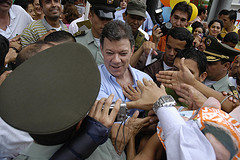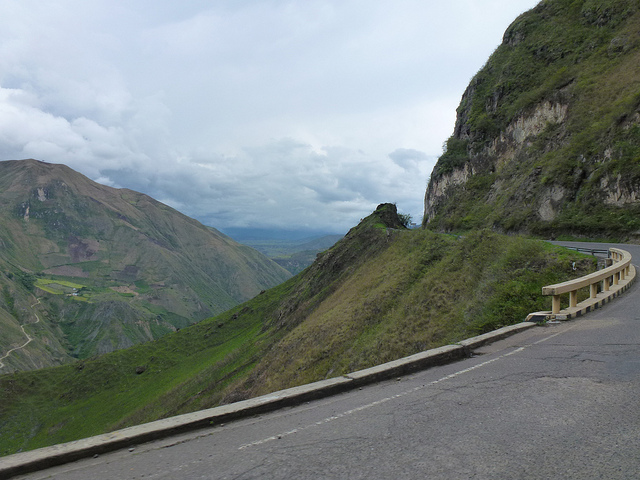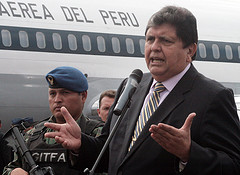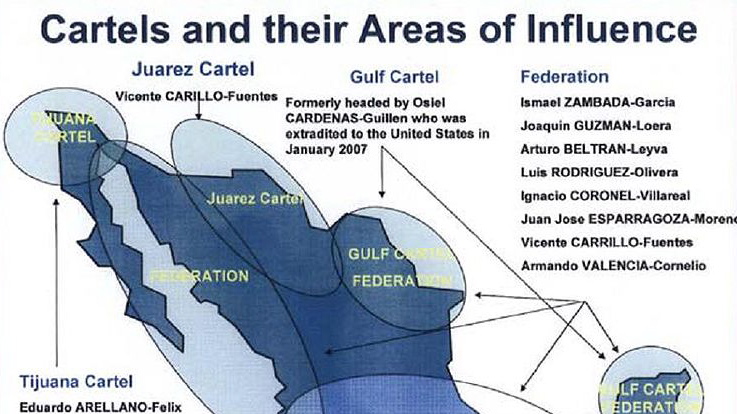
Latin America: Week in Review
Chile Hands Over Highly Enriched Uranium To the United States
April 9, 2010 By Staff
Today in Latin America
 Top Story — Chile became one of the first countries to hand over highly enriched uranium (HEU) from its nuclear reactors to the United States for safe storage. The Associated Press reported the story yesterday, the same day that President Barack Obama and Russian President Dmitri A. Medvedev signed a nuclear arms control treaty.
Top Story — Chile became one of the first countries to hand over highly enriched uranium (HEU) from its nuclear reactors to the United States for safe storage. The Associated Press reported the story yesterday, the same day that President Barack Obama and Russian President Dmitri A. Medvedev signed a nuclear arms control treaty.
The U.S. will also hold a nonproliferation summit next Monday in Washington, where Obama is expected to ask countries to work with the U.S. in removing weapons-grade HEU from reactors, as Chile did.
“We are happy to see it go,” Fernando López of the Chilean Nuclear Energy Commission told The Associated Press. “Countries normally don’t want to be loaded with waste from other countries,” López added. “To put it in a safe place is valuable for everybody.”
U.S. and Chilean engineers worked last month to remove the 40 pounds of HEU before it was shipped out of Chile under U.S. Coast Guard supervision, through the Panama Canal, to Charleston Weapons Station in South Carolina.
The United States is the only country in the world to dispose of uranium and many countries, including Russia, rely on the U.S. for this process. This disposal process is part of Obama’s strategy of focusing concerns of nuclear nonproliferation to rogue states and terrorists and away from former Cold War adversaries.
“For the first time, preventing nuclear proliferation and nuclear terrorism is now at the top of America’s nuclear agenda,” Obama said, according to the Associated Press.
For more information, view the AP video below.
Just Published at the Latin America News Dispatch
- Beyond Borders: A local-federal partnership to enforce immigration law needs clarity, according to a recent study.
- From the Blog: Six people were killed in Peru on Sunday, as police disbursed a wildcat miners’ protest.
Headlines from the Western Hemisphere
North America
- A 5.3 magnitude aftershock struck near Guadalupe Victoria in Northern Baja California, Mexico, days after the region was hit by a 7.2 magnitude earthquake on Easter Sunday.
- Mexican authorities found the bodies of 12 people, allegedly killed by drug traffickers, near the town Xalisco in the border state of Nuevo León.
Caribbean
- The Obama administration lifted the prohibition against traveling to Cuba to provide aid to government opponents and pro-democracy activists.
- The Cuban government plans to use its May Day march as a show of support for the government, in order to deflect recent criticism over the country’s human rights record.
- Haiti’s signature rum producer, Rhum Barbancourt, is poised to resume shipping again, despite suffering about $4 million in losses from the Jan. 12 earthquake.
Central America
- Ecopetrol S.A., the Colombian oil company, might bid on exploration rights for areas in Guatemala.
- Costa Rican President Óscar Arias said the Catholic Chruch should end celibacy vows for priests, arguing that forbidding sexual relations goes against nature.
- Defender Deris Umanzor from Club Deportivo Águila of El Salvador was acquired by the Major League Soccer team, the Chicago Fire.
Andes
- Colombian police arrested Héctor José Buitrago, an alleged paramilitary leader who refused to surrender in 2005 when 30,000 paramilitaries demobilized. He was wanted on 21 warrants for alleged killings and drug-trafficking.
- Colombian presidential candidate Juan Manuel Santos said that if he won next year’s elections he would foster better ties with neigboring Venezuela.
- Wildcat miners in Peru ended their roadblock Wednesday in response to a government promise to hold a joint commission to study the dispute over the effects of regularizing informal mining.
- 120 countries and international organizations confirmed that they will attend the World People’s Conference on Climate Change on April 19-22 in Cochabamba, Bolivia.
Southern Cone
- In Rio de Janeiro, Brazil, bodies continue to be dug from the debris resulting from landslides that ravaged the city in recent days.
- Ford Motor Co. announced Thursday it will invest $200 million in Brazil over the next five years to develop the EcoSport small SUV, already a top-selling vehicle in Brazil, for the global market. Ford will invest an additional $250 million in Argentina over the next two years for development and production of a new vehicle, which is intended for Ford’s Latin American markets.
- Argentina’s stocks and bonds sunk Wednesday after the U.S. declared the country’s Central Bank is indistinguishable from the government and creditors can seize assets for debt repayment.
-
Chile’s President Sebastián Piñera wants to deepen free market reforms and encourage the country’s return to international bonds to help pay for damage from February’s 8.8 magnitude earthquake. The government is responsible for $8 to $10 billion of an estimated $30 billion of reconstruction costs.
- Presidents of Chile and Argentina said Thursday in Buenos Aires that ideological differences will not keep them from working together.
- Uruguay’s President José Mujica strengthened ties with Venezuelan President Hugo Chávez when the two signed accords to strengthen trade and energy relations between the two countries. Venezuela will help Uruguay expand an oil refinery and supply it with crude oil.
- Uruguay’s unemployment rate rose sharply from 6.3 percent in January, to 7.5 percent in February.
Image: BlatantNews.com @ Flickr.





